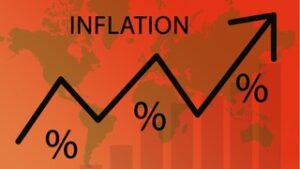Buckle Up – It’s Going to Be a Long, Hard Ride

The Republicans are grousing about inflation. It’s higher than it’s been in 40 years, they point out. It’s hurting working-class and even middle-class Americans. And it’s all Biden’s fault.
The Biden administration originally denied the complaints about the rising consumer price index (CPI). They said it was temporary. The result of the supply-chain problem, which was clearing up. Then, when the rise persisted, they said it was nothing to worry about. We have good employment numbers. Wages are going up. The economy is healthy. Even their top fiscal and monetary appointees, Treasury Secretary Janet Yellen and Fed Chairman Jerome Powell, discounted the early CPI data as a serious economic threat, just as they disputed the data that showed that the US had slid into a recession.
Republicans are implying that if they take control of the House and Senate in the mid-term elections, they will bring inflation down by reversing Democratic policies. That’s not true, Biden is saying. If the Republicans get control of Congress, inflation will go up!
If you’re younger than 50, you were just a kid the last time the US economy had multiple years of high inflation. It may be hard to imagine what a sustained period of double-digit CPI numbers, combined with a sluggish economy, feels like. But if you were working in the 1970s and early 80s, when US economy experienced an extended period of high (double-digit) inflation, you would be alarmed.
Right now, the CPI is at 8%, while wages, on average, have gone up only 3%. That leaves a 5% gap. Five percent is not good, but the reality is even worse. There was a time when the CPI was a reliable indicator. Now, it’s skewed. The calculation no longer includes the cost of food and energy. And food and energy have gone up considerably more than 8%. For the average American, for whom food and energy represent a significant portion of the family income, the effective inflation rate is more like 12% to 15%, depending on how you do the math. That means the gap – the actual loss of buying power – is more like 9% to 12%. In other words, double-digit inflation.
Those of us that were supporting families in the 1970s and early 80s remember the effect of double-digit inflation over several years. It’s very, very significant. If your income isn’t increasing rapidly, you can feel yourself getting poorer, almost by the week.
Consider this: Four years of 12% inflation means your purchasing power drops by more than half.
The ABCs of Inflation
Inflation is caused by deficit spending – i.e., governments spending money that they don’t have. They do this by some form of borrowing. The US does it by selling (and sometimes buying) Treasury bonds.
All responsible parents understand and teach their children that deficit spending is wrong. And children learn that they can’t have everything they want, just because they want it. Begging and pleading isn’t the right way to get it. They must earn it. Or, if they want to borrow it, they must be sure they can pay it back.
When it comes to government spending, many people seem to believe that this fundamental rule of economy (and ethics) does not apply. The politicians that vote for programs that require deficit spending, and the people that vote for those politicians, seem to believe that the same fundamental laws do not apply when it comes to the government. I’m sure some of them believe that what they are doing in ratcheting up US debt is for the greater good. If someone points out that they are spending money irresponsibly, they see such criticism as mean-spirited.
And that’s because most of them, along with most of the people that vote for them, haven’t the slightest understanding of what they are actually doing. Deficit spending and federal debt are abstractions to them. They tell themselves that what they are doing is good, that they are not interested in the theoretical warnings of the complainers. They are interested in the real world. And in helping real people by passing programs that will really help.
What they don’t know, because they don’t understand the ABCs of fiscal and monetary reality, is that the money they are spending is not real. It is IOU dollars, created out of thin air, that, one way or another, will one day be paid back.
In the meantime, they keep spending.
The programs that politicians spend money on depends on their political preferences. Historically, Democrats liked to spend money on social welfare programs. Republicans liked to spend it on warfare.
What’s happened in the last 20 years or so is that both parties have gradually widened their willingness to spend money. Democrats like war spending as much as or more than Republicans. And Republicans are happy to spend money on social programs so long as it gets them votes.
What We Should Expect
There are many similarities to what is happening now and what was happening in the 1970s prior to the bouts of double-digit inflation we had then.
For one thing, each of those inflationary periods was triggered by Mideast energy crises (OPEC and Iran). We have an energy crisis today.
Those energy crises were triggers. But they were not causal. The cause was an accumulation of federal debt. In 1981, the debt was about $1 trillion. That was enough back then. And $1 trillion 40 years ago might be, say, $10 trillion today. But the federal debt is now $31 trillion. In absolute terms, that is 31 times more. Even in relative terms, it’s greater by 300%.
How can anyone possibly think that the US can pull itself out of this enormous level of debt without either a sustained period of double-digit inflation or a sustained recession, or both?
Inflation is here and it is likely to get worse. It was caused not just by the Biden administration, but by the Obama and Trump administrations, as well. Spending money you don’t have, pols believe, is how you get and stay elected. When the pandemic came along, the spending skyrocketed.
The only way to keep the US economy from moving into double-digit inflation is by raising the cost of money at the federal level. By making money more expensive, the supply of it and the velocity of it is reduced. Less money in circulation means lower inflation.
Jerome Powell has been pushing back against inflation by raising the federal lending rate. It was basically zero when he took office. He’s raised it four times. It’s currently 3% to 3.4%. That is a lot better than zero, but it’s not nearly enough. To defeat inflation, he’d have to do what Paul Volcker did during Ronald Reagan’s administration. Volcker realized that the only way to beat inflation was to raise the federal lending rate to 20% in June of 1981. That broke inflation’s back. By 1983, the inflation rate was down to 3%.
I don’t think Powell has the courage to do what Volcker did. Nor do I think that the Biden administration, even with a Republican majority in Congress, will have the courage to push him to do it.
I think what we will see is some tough talk on raising rates and then a capitulation. The Fed, the administration, and the Congress will continue to spend money they don’t have, while telling their constituents that it’s the other party’s fault… and hope that somehow the time bomb of federal debt will not explode while they are still in office.

